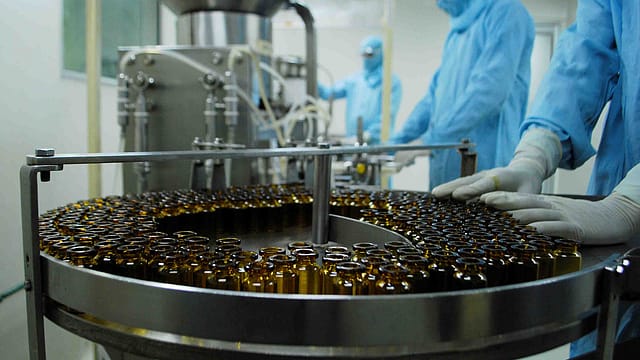National Pharma Policy to harmonise drug standards with global norms, simplify licensing
ADVERTISEMENT

The Ministry of Chemicals and Fertilisers is working on a National Pharmaceutical Policy that will support harmonisation of India's regulatory standards with international best practices.
An approach paper circulated by the ministry for stakeholder comments says the new policy should balance innovation with safety, reduce compliance burden while ensuring that pharmaceutical companies seamlessly adhere to global standards. "This harmonisation not only streamlines the research and development process but will also enhance the credibility of Indian pharmaceutical products on the global stage," the ministry's paper said.
The ministry wants the policy to simplify the licensing system to avoid duplication of efforts and ensure better coordination among different regulatory authorities that govern the pharmaceutical sector. It will support measures meant to enhance ease of doing research and business including the creation of a single window clearance system for licensing of pharmaceuticals by co-opting all the stakeholder departments across ministries. Enhancing the role of Indian Standards like BIS and designing a coherent pricing regulation, exploring feasibility of the roll-out of a mandatory track and trace mechanism for products to ensure quality etc are some other measures considered to be supported through the proposed policy.
The government wants the new policy to balance the need for affordable medicines and profitability of pharmaceutical companies. The policy will aim to complement the National R&D Policy by supporting process optimisation, development of technology based/enabled platform, regulatory capacity, and legislation.
International partnerships for decentralised manufacturing facilities and· government-to-government drug distribution initiatives are also being considered by the government.
January 2026
Netflix, which has been in India for a decade, has successfully struck a balance between high-class premium content and pricing that attracts a range of customers. Find out how the U.S. streaming giant evolved in India, plus an exclusive interview with CEO Ted Sarandos. Also read about the Best Investments for 2026, and how rising growth and easing inflation will come in handy for finance minister Nirmala Sitharaman as she prepares Budget 2026.
The broad objectives of the policy include the transformation of India into a prominent global R&D hub for the pharmaceutical industry and shifting from a volume-based to a value-based leadership model, endorsing the "Make in India" drive to ensure self-sufficiency in pharmaceutical production, attracting foreign investments and the harmonisation of regulatory approvals and an emphasis on transparency in pricing mechanisms.
The approach paper said that the process undertaken for the drafting of the National Pharmaceuticals Policy (2023) was end-user and stakeholder led.
The Department of Pharmaceuticals is already implementing three PLI schemes- Pharmaceuticals, Medical devices, and API/KSM/bulk drugs respectively. The Central government has also announced plans to establish three bulk drug parks and four medical devices parks in collaboration with the state governments. A scheme for Promotion of Research & Innovation in Pharma Med Tech Sector was the latest government initiative meant to create an ecosystem for innovation in pharmaceutical and med-tech sector.
